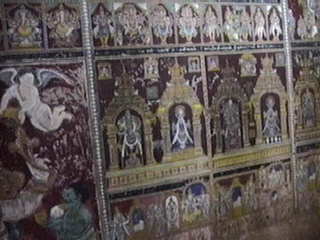Description: Sri Kumarar
Koyil is located in Ilanji near Tenkasi.
Nearby, in the village of Panpoli is the hill temple of Tirumalai Kumarar. Ilanji is located
at a distance of 5 km from Tenkasi and 3 km from Kutralam.
Pictured below is a panel from the Chitrasabha at Kutralam.

The name ilanji stems from the stala
vriksham magizha maram and also from the richness of the land abounding in water
resources. Arunagirinathar has revered this shrine in his tiruppugazh
hymns. Ilanjimurugan Ulaa, and the Kutralanathar Puranam
speak of the glory of this temple. Several other literary works also speak of the glory of
this shrine.
Legends: This temple is closely linked to Kutralam, in terms of the legends associated. Both these
temples are associated with the legend of Agastya muni, proceding to the
southern lands from the Himalayas, following Shiva's
command - to balance the tilt of the earth with his weight; the earth had tilted
dangerously following the assembly of all living beings at the Himalayas to witness the divine marriage between Shiva and
Parvati.
Following Shiva's bid, Agastyar is believed
to have reached Kutralam, the site of the present
day temple to Kutralanathar, which then was a Vaishnava temple, into
which he was refused entry.
Agastyar is then believed to have worshipped
Murugan at Ilanji, and then proceded to Kutralam in the guise of a
Vaishnava devotee and by amiracle converted the image of Vishnu to that of a Shivalingam.
The name Kutralam comes from the legend that the image was shrunk
(kurukkudal) into that of a Shivalingam.
The Temple: This east facing temple has 2
entrances, 2 prakarams, an ardhamandapam, mani mandapam and mahamandapam. Also here are
shrines to Surya, Dakshinamurthy, Saptamatas, Jwarahareswarar, 63var, Venugopalar, Kasi
Viswanathar, Visalakashi, Kutrala Nathar, Shanmukhar.
Iruvaalukanathar's shrine is to the left of Skanda's shrine.
This temple was renewed in early 15th century.
The presiding deity here is Kumaran, enshrined in the central sanctum,
flanked by his consorts Valli and Deivayanai. There are
also major shrines to Iruvaluga eesar (believed to have been worshipped by Agasthyar) and
Iruvaluga Eesarkiniyaal. There are also shrines to Kanni Vinayakar, Shenbaga Vinayakar,
Kuzhal Vaimozhiamman, Chandikeswarar, Bhairavar, Venugopalar, Suryan, Saneeswaran,
Agasthyar, the Saptamatas, the 63 Nayanmars and Ayyanar.
This temple with 2 prakarams has two entrances. The sanctum
faces the east; there are the Ardha mandapam, the mani mandapam and the maha mandapam in
front of the sanctum. A three tiered gopuram covers the entrance to the innerprakaram.
Shiva's shrine faces east while Ambal's shrine faces south. Much of the current structure
of the temple dates back to the 15th century.
The name Iru valuga Eesar arises from the fact that Agasthyar
made a two Shivalingams out of the white sands (valugam) of the Chitra nadi flowing nearby
and then combined the two into one Shivalingam, which now adorns the sanctum. Since the
Shivalingam is fashioned out of white sand, no abhishekam is performed. Offerings of
Shenbaga flowers to Shiva are considered to be very special here.
Festivals: Six worship services are offered each day here.The
procession bearing Skanda stops at the Kutralanathar shrine to receive offerings during
the annual Bhramotsavams.
Skanda Sashti is celebrated in great splendour here. During
this festival, Subramanyar is portrayed as Bhrama, Vishnu, Shiva, Maheshwara,
Sadasiva and finally again on Shiva on the 6 days of this
festival. The final day of this festival involves the enactment of Surasamharam.
This portrayal is tied to the legend that Subramanya
here manifested himself as the trinity Bhrama, Vishnu and Shiva - when asked by the sages Kapila,
Kashyapa and Durvasa the question as to who was the greatest
among the trinity. Chittirai Vishu (Tamil new years day) and Kartikai
asterism in the month of Aadi are also celebrated here.
Interestingly, In the annual festival at the Kutralanathar temple, Shiva appears as Bhrama, Vishnu,
Rudra, Eswara, Sadasiva and Subramanya. Also in Kutralam, Aippasi Vishu (the transition of
the sun to Libra, its weakest house) is celebrated, as is Chittirai Vishu (the transition
of the sun to Aries, its strongest house).

